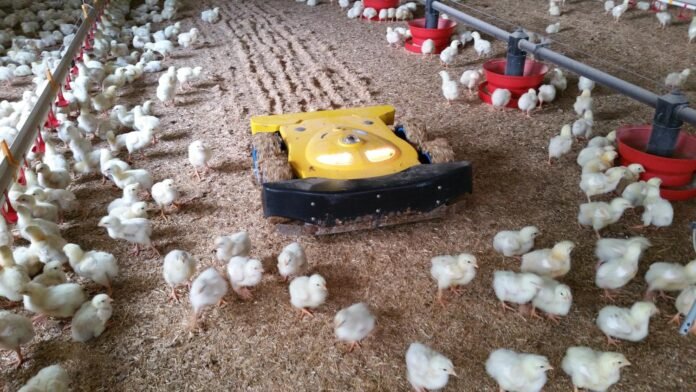Iowa’s poultry industry is on the verge of a major transformation, thanks to a new robot designed to help turkey farmers. Jack Kilian, an inventor from Coralville, has spent the last five years perfecting the Poultry Patrol robot. This device is poised to help farmers improve efficiency, address labor shortages, and boost biosecurity.
Kilian’s journey began with one simple idea creating a robot that could assist with tasks in poultry barns. The robot is now in its prototype phase and has already undergone extensive testing on turkey farms. Recently, Kilian received a $50,000 loan from the Iowa Economic Development Authority, which will support further refinement of the robot and enhance the manufacturing process. Kilian believes that once the robot becomes affordable, it will significantly improve farm operations.
Farmers like John Zimmerman, who has tested the prototype on his Minnesota turkey farm for years, recognize the robot’s potential. Zimmerman views the robot as an extra set of “eyes and ears” for farmers. It can help address labor shortages and health problems affecting their flocks. Moreover, Zimmerman believes the robot’s consistent patrols could offer great promise in maintaining turkey health.
The Poultry Patrol robot is designed to be a crucial part of daily farm operations. It moves around the barn, monitoring feeding stations and ensuring turkeys stay active. By preventing the birds from becoming sedentary, it helps maintain their health. Kilian’s team has already observed improvements in flock health, leading to better-quality poultry products and higher profits for farmers.
Furthermore, biosecurity is another major concern that the robot helps address. By reducing human contact with the birds, the Poultry Patrol plays a key role in preventing disease transmission. Given the ongoing threat of avian flu, limiting human interaction in barns has become even more essential. Therefore, Kilian’s robot provides farmers with a valuable tool for minimizing these risks.
The robot is equipped with cameras and sensors, allowing it to patrol the barn autonomously. When its batteries run low, it docks itself for recharging, ensuring it remains operational around the clock. However, there is still one challenge: reliable broadband internet in rural areas. Despite this obstacle, Zimmerman believes the health benefits provided by the robot far outweigh this issue.
As Kilian continues to improve the robot, he is receiving more inquiries from farmers interested in expanding its functionality. For example, future features could include infrared cameras for temperature detection, a rake to prevent bedding from compacting, and even the ability to remove dead birds. Kilian sees these possibilities as the next logical steps in enhancing Poultry Patrol’s value to farmers.
In conclusion, Poultry Patrol represents a groundbreaking advance in agricultural technology. It offers solutions to labor shortages and biosecurity risks in poultry farming. As the robot continues to develop, it could become an essential tool for turkey farmers, streamlining operations and boosting profitability. In the long run, Poultry Patrol is paving the way for a future where robots play a vital role in modern farming.
For more business news updates, visit Dc brief.


